Andrew Hiller's Blog, page 2
April 29, 2019
A Wilde Night in Takoma Park
I’m early as I always am. My training as an NPR reporter insists that I maintain this discipline. I want my hand seen. I want to see the speaker and her body language. Tone matters. Inflections matter. Everything that occurs at a presser carries a message. Even as a radio reporter, all five senses count.
My sketchpad sits on my lap and I begin a new page. Random doodling. Nothing serious. In comes Fran Wilde. I smile. I may be the 2019 Baltimore Faerie Faire Author of the Year, but she won the whole Nebula. More importantly, I’ve loved her books. Her stories so far have been delicate, precise, and character driven. You can read the craftsmanship, the intelligence, and a see bit of heart in each one. In short, they soar. That’s why I’m here not as a reporter, not even as an author, but as a friend of her books. I’ve enjoyed them so much not only did I read and review them, but included them in my best of the year write-ups in 2017.
Fran chats with a librarian. The room is empty except for us and someone from Politics and Prose. I give her space because I know how important prep time can be. Besides, my fingers are happily absorbed in motion, composition, shade and texture. The author pauses and studies my sketch, she smiles, then asks my name.
She knows who I am. She says it’s a pleasure to finally meet me!
She compliments my drawing. 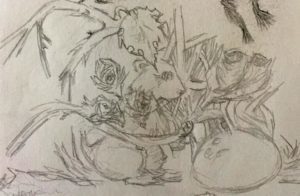 This means something because if you ever go to Wilde’s Instagram account you will discover that she is quite a talented doodler. Her scanned journal pages are rife with beautiful illustrations. So, we talk art. I discover that she once was forced to make the choice between paths… art school or literary. I’m glad she choose as she did, but even gladder that she never lost that part of herself. Later, during her presentation, she notes how she sometimes uses sketches to sharpen her concentration and memory. Interestingly, I said the same thing to my friend Phil a few minutes earlier to explain why I had brought a sketchpad to a reading. So, given permission by Fran herself, I sketched through her reading. If you ever what a Fran Wilde reading looks like… here’s my interpretation (including my representation of one her witch balls.)
This means something because if you ever go to Wilde’s Instagram account you will discover that she is quite a talented doodler. Her scanned journal pages are rife with beautiful illustrations. So, we talk art. I discover that she once was forced to make the choice between paths… art school or literary. I’m glad she choose as she did, but even gladder that she never lost that part of herself. Later, during her presentation, she notes how she sometimes uses sketches to sharpen her concentration and memory. Interestingly, I said the same thing to my friend Phil a few minutes earlier to explain why I had brought a sketchpad to a reading. So, given permission by Fran herself, I sketched through her reading. If you ever what a Fran Wilde reading looks like… here’s my interpretation (including my representation of one her witch balls.)
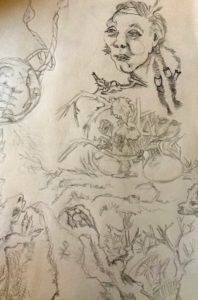
The reading.
Fran shares a moment from her latest book, a middle grade fantasy called Riverland. It’s a portal adventure that may bare echoes of her own childhood favorites like the Phantom Tollbooth and the Chronicles of Narnia. I’ll fill you in later on the book after I read it. In the meantime, Wilde’s reading augers it will be a fun book even if she did cruelly ended her recitation on a cliffhanger.
Afterwards, Wilde pulls out typing paper and pencils. She informs us that we are going to draw a map and leads a quick lesson on story-mapping which is a kind of visual outlining. The idea is basically to plot out the narrative arc using icons indicating the major events from the beginning to the resolution. I don’t know if this means that Fran is a plotter who eschews pantsing, but it was a neat exercise.
Then, perhaps the best part of the evening.
Sharing.
One of the great things I learned about Fran Wilde that day, unless she’s faking it, is how genuinely supportive she is. She encouraged every child to share their map. With great warmth in her voice, she told them to finish their stories and how much she looked forward to hearing/reading them when they were done. The evening thus became at least a little bit about her audience and not her which is what author events should be like. We readers do come to celebrate an author we cherish, but we are also there for us. Fran gets that.
She gives.
I have to admit I did chicken out a bit. Part of me wanted to pitch my novel, A Halo of Mushrooms for her Cooking the Books’ podcast. After all, Halo takes place largely in a bakery and magical cooking is a key ingredient to what makes the story work. I wasn’t sure the moment was appropriate though and having been ambushed I let the moment pass. Besides, I enjoyed the event and didn’t want her to think I came for mercenary reasons.
Should you read Riverland? Should your children read Riverland?
I’ll offer my opinion soon. In the meantime if you haven’t read Updraft, Cloudbound, and Horizon… get to it. I think you’ll like them.
April 16, 2019
Becoming the 2019 Baltimore Faerie Faire Author of the Year turned out to be something to croon about… Literally!
What fun! I really didn’t know what to expect when I accepted the Author of the Year recognition from the Baltimore Faerie Faire, but there was belly dancing, big bands, folk music, a hoard of really cool/fun people…
AND I was given a key to the Faerie Kingdom!
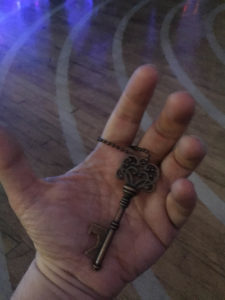
It all started when I received a random Facebook friendship invite. I checked out their stream before accepting (My sister taught me to do this.) Happily, the person passed the spam test so I clicked “approve.” Almost immediately I received an IM.
My newest friend started off by thanking me, and launched into how much she loved A Halo of Mushrooms. She’d picked up a copy at Mars Con in January, devoured it, read passages to her husband, and brought it to the attention of her reading group. I felt flattered and thanked her. Then, she added that she was one of the organizer’s of the Baltimore Faerie Faire and not only wanted me to come, but to be their author of the year.
Swim, small fish, swim!
I got the details, checked out the website, and said, “Yes.”
It turns out the Baltimore Faerie Faire is not only a warm community, but enough of a big deal to be included in the official state of Maryland’s tourism website. It took place over two days. On April 13th, they held the Masquerade Ball and on 14th was the Faire itself. My major duty was to step before the faerie court to ease the transition between the seasons and aid in the passing of the baton from the Winter Queen to the Spring. I also had a table for signings and some other authorly roles. Both Seelie and Unseelie 
Becoming the 2019 Baltimore Faerie Faire turned out to be something to croon about… Literally!
What fun! I really didn’t know what to expect when I accepted the Author of the Year recognition from the Baltimore Faerie Faire, but there was belly dancing, big bands, folk music, a hoard of really cool/fun people…
AND I was given a key to the Faerie Kingdom!

It all started when I received a random Facebook friendship invite. I checked out their stream before accepting (My sister taught me to do this.) Happily, the person passed the spam test so I clicked “approve.” Almost immediately I received an IM.
My newest friend started off by thanking me, and launched into how much she loved A Halo of Mushrooms. She’d picked up a copy at Mars Con in January, devoured it, read passages to her husband, and brought it to the attention of her reading group. I felt flattered and thanked her. Then, she added that she was one of the organizer’s of the Baltimore Faerie Faire and not only wanted me to come, but to be their author of the year.
Swim, small fish, swim!
I got the details, checked out the website, and said, “Yes.”
It turns out the Baltimore Faerie Faire is not only a warm community, but enough of a big deal to be included in the official state of Maryland’s tourism website. It took place over two days. On April 13th, they held the Masquerade Ball and on 14th was the Faire itself. My major duty was to step before the faerie court to ease the transition between the seasons and aid in the passing of the baton from the Winter Queen to the Spring. I also had a table for signings and some other authorly roles. Both Seelie and Unseelie 
March 30, 2019
The Querulous Quagmire or the Quarrelsome Quest to Query
So, you’ve finished your manuscript, addressed the concerns of alpha readers, beta readers, your critique group, and conducted countless bouts of self-review. Now, you stand upon the parapet. Before you lies undiscovered country, all the foreign states of agency. A lush forest whispers of fruit, but carries the snarls of werewolves. A wind carries the aroma of a farm’s harvest. Then again, the peasants are grumbling amidst a smell of burning torches. Worse, you suspect the barn’s roof made of gingerbread?
Worse, reaching into your quiver you find but a single quarrel. You seek aid, wisdom… intelligence. As you load your crossbow, it occurs to you that shooting a single missile will do no good. Better to send out a call. So, noticing a scrap of paper, you wrap a missive around your missile.
But what to write?
What can you possibly write that’s concise enough, clear enough, and potent enough to rally people to your flag? How with one shot can you light the Beacons of Gondor?
Last weekend, I attended an intensive workshop at a Society of Children’s Book Writers and Illustrators conference. The target of which was to help authors to aim their queries and teach them to loose true. The following is a breakdown of what an editor from Penguin Books shared with us. It was a remarkable session and I recommend attending something like SCBWI if you struggle with query writing as I do. This write-up doesn’t include everything, but I hope it helps.
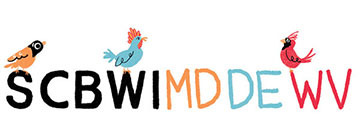
The Goal of a Query
The first question posed was, “What is the purpose of a book query?” The answer we were given was that the true purpose is not to sell your book, but to make the person receiving the query go “Wow!”
Specifically, you want to present something that excites the editor or agent and helps them position your work, provides them material that will rev up booksellers, reviewers, bosses, etc. In other words, you want to put before the agent or editor all the ammo that provides ammo that will allow her to pitch it to sales people, marketers, her bosses, bookstores, and everyone down the chain. You want to give them a reason to believe that you book will move.
In simplest terms, the goal of your query is to make the life of your prospective agent or editor easier. Your query helps them write their positioning sheet.
That means your query is not just a means to pitch your story, but an adaptable tool that a whole bunch of people can constantly use to solve any number of present or future problems.
In reality, that means that play by play is out when writing your synopsis. When putting out a fire, you don’t want to read an encyclopedia. You want a simple diagram with as few pictures as possible. So, yes, your story is the most important thing, but prune it down to its very core. Include comps that reflect the current market and demonstrates your knowledge of trends. Be specific and timely. Your comps should probably not be more than three years old. As for your bio, think about the bullets on your professional resume. Include only the points that prove your the right author for this project or a person who has the right connections to make the work take off.
Think of writing your query as filling a tool chest. Everything you put in there ought to serve a purpose. Everything you put in there ought to be placed in its proper spot so that it is easy to find and access.
At the same time, despite its brevity, remember that your query is your first impression.
Appear approachable, likable, respectful, and every other adjective you can think of when you head out on a job interview or on a first date. After all, the work of a book often begins after a contract is signed. That suggests that the editors or agents are stuck with you for at least a year. Chances are, they want to hang around someone who’s easy to work with. If nothing else, remember “please and thank you.”
Finally, Remember that while every brushstroke counts, showing appreciation is never a waste of paint.
Got it? That’s the basics. Now, load up that crossbow, take careful aim, and fire.
January 31, 2019
The serious business of writing humor
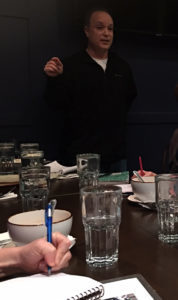 I was recently asked to lead a workshop on humor for the Silver Spring Writers’ Meetup Group and while I’ve been lucky enough to sell my humorous commentaries on NPR or find a publisher to print my fictional riffs like any good writer, reporter, or author the first thing I did was hit the books and research. I know what I know, but there are many out there who know so much more than me. The first thing to keep in mind is the inherent contradiction in humor writing. Humor, like all writing, is hard, but it’s also easy. Every one of us has told a successful joke, provoked a laugh, or relayed a story that others found amusing. How to then take that moment and convert it into funny prose or dialogue proves a bit trickier. It requires writing, rewriting, experimentation, and more rewriting. Like any craft, it requires work and a modicum of talent, but there are tools of the trade that we all can pick up.
I was recently asked to lead a workshop on humor for the Silver Spring Writers’ Meetup Group and while I’ve been lucky enough to sell my humorous commentaries on NPR or find a publisher to print my fictional riffs like any good writer, reporter, or author the first thing I did was hit the books and research. I know what I know, but there are many out there who know so much more than me. The first thing to keep in mind is the inherent contradiction in humor writing. Humor, like all writing, is hard, but it’s also easy. Every one of us has told a successful joke, provoked a laugh, or relayed a story that others found amusing. How to then take that moment and convert it into funny prose or dialogue proves a bit trickier. It requires writing, rewriting, experimentation, and more rewriting. Like any craft, it requires work and a modicum of talent, but there are tools of the trade that we all can pick up.
The event went really well. We laughed, brainstormed and discussed the rules and when and how to break them. Even better, one of our authors, Brian, brought a rubber chicken! For those reading this blog who didn’t get a chance to attend, here are some of the semi-pro-tips discussed:
For me, humor all starts with a Muppet and so I began with a story… because what else would a writer start with!
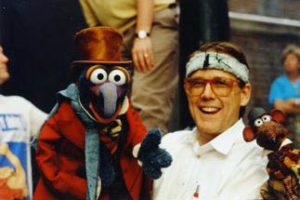
When Dave Goelz started with the Muppets, he came in with the confidence of an industrial designer (which was what he was.) Having never been trained in comedy or puppetry, when stars like Danny Kaye would enter the room he would often exit, feeling he didn’t deserve to share the same space. In fact, Dave famously told me that during the first season of the Muppet Show the cameramen all took Gonzo’s scenes as down time… a time to take a nap. Dave’s Gonzo was always weird, but he was also just very downbeat and kind of depressed during those first few episodes. Frank Oz used to counsel Dave:“Listen. Your job is to be a fool! Go for it!”
Following one of these sessions, Gonzo’s next scene required him to deliver an emphatic “No!” Dave mustered his courage and overdid it. “NOOO!!!” he cried. it earned the character his first belly laugh from the crew.
A light switched on and Dave’s characters took off. Soon, both Gonzo and Dave Goelz became primary characters in the Muppet universe.
The moral of this story is several fold: first when doing comedy go for it… half measures and playing it safe rarely gets the laughs. Second: Less can be more. Dave didn’t need a whole lot of words to earn his laugh. It was the energy and intensity of a single syllable that did it. Lastly, don’t apologize, don’t explain just be a fool and let it rip. The moment earns the laugh as often as the joke itself.
A few specifics and tips about ways to write humorously
If you are going to use humor in your piece there are a couple of things to keep in mind
Introduce it early
Make it clear that you are trying to be funny
Gives permission for your audience to laugh
Don’t explain the joke. An explained joke is almost never funny.
It’s a sign the joke didn’t land
It’s an insult that suggests that your audience isn’t smart enough to get it. If a joke doesn’t land, cut it, or leave it and move on to the next one.
100 jokes rule: Mel Brooks believed in rapid fire jokes. If you tell a hundred jokes, but only thirty are funny. The audience leaves remember laughing a lot!
Be strategic

Good joke writing is rewriting. Edit and test. Some of the best stand-ups try out material for free in local clubs just to refine or see if an idea bombs.
Punch lines should be shorter, faster and funnier.
Set ups can be long. Punch lines are quick. Think about it. If a punch is slow then your target has time to dodge.
Don’t scatter jokes willy-nilly; instead, use them as seasoning to spice the scene or help to define the character. Remember the best comedy serves the story and not the other way around.
Don’t lose your story’s focus
The story should come first. Don’t sacrifice plot, tension, conflict and character for a cheap laugh. Your joke or humorous situation should fit the world and the characters you are writing. It should not stop the pace or the action.
in a really well written script you should theoretically be able to pick a line at random and someone who is familiar with the characters can tell you who says it. Don’t randomly assign a joke to a character. Use it as a way to build the character.
Punch up not down.
Taking swipes at defenseless groups is bullying not funny
Beware of sarcasm
Better to make fun of yourself
Watch your references
Topical jokes may be cliché by the time your reader gets to them
Topical jokes may be dated or lost to time (Monty Python jokes about Parliament don’t necessarily land with an American audience.)
If your writing is too authentic in terms of slang or local/foreign color, you may lose readers or force them to stop reading/living in your story in order to try to decipher your meaning.
Judge the value of the authentic. If a detail helps move the story or is important to the defining the characters, keep it. If it creates too much work for the reader… it may not be worth it.
Types of Jokes:
Exaggeration or fabrication, creative misdirection, observations, comparisons, topical
Use alliteration, percussive consonants, puns, and metaphors. K rule- words with the letter K are funny: Kumquat, Cadillac, sex. Hard G rocks the grins too.
creative misdirection– engaging readers by taking them someplace they don’t expect to go
THE RULE OF THREE
Writing comedically usually requires establishing a pattern (with the setup) and then misdirecting the reader (with the punch line). One simple way of doing this is to pair two like ideas in a list and then add a third, incongruent, idea.
Repeating a thing three times also fixes in the mind of the reader that a thing is important.
EG: Losing weight is simple: Eat less, exercise more and pay NASA to let you live in an anti-gravity chamber.
THE CLICHÉ JOKE
If comedy relies on misdirection, what better way to achieve it than with a phrase your readers already know? If you write, “You can lead a horse to water …” every reader will assume you’re going to finish with…
Comparison:
As writers, we’re comfortable with metaphors, so think of comparison jokes as simply metaphors. The idea is to create a visual that is absurd yet is also imaginable. For example, Leigh Anne Jasheway tells this comparison-based joke.
“… this stupid hospital gown is riding up my ass. I try to pull it down and it snaps right back up like a window shade. I cross my legs and suddenly I’m Sharon Stone.”
If all else fails… pull out the rubber chicken!!!
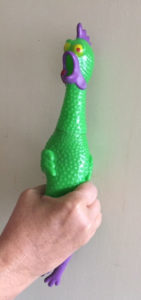
Resources and source material for this blog article:
Cobblestones: Going Gonzo for Jim Henson
https://www.writersdigest.com/online-editor/how-to-mix-humor-into-your-writing- Leigh Anne Jasheway
https://www.writing.ie/resources/the-golden-rules-of-writing-comedy-by-caimh-mcdonnell/- Article by Caimh McDonnell
January 22, 2019
A smile for Catherynne Valente
Catherynn Valente’s works bring me joy. Her clever and intricate wordsmithing, sense of humor, and the humanity of her stories appeal to me in a big way. I’ve been a reader of hers since I worked on a piece about NANOWRIMO for NPR and almost managed to include her as one of the guests. It didn’t work out then because of timing, but she was very nice. In any case, after corresponding with her a few times, I decided to check out her works. And from Fairyland to Space Opera, I have found pleasure, smiles, and more than a few chuckles. So, it probably doesn’t come as much of a surprise that I was delighted to find out that she was going to be one of the Guests of Honor at a science fiction convention that I was also scheduled to attend.
On Friday to my delight, she found my author table at Mars Con. She carried her baby with her and wore the kind of mischief and twinkle in her eye that I hoped for. We spoke very briefly about this and that, but before she left, I took one of my comedy magnets from my table and presented it to her. I wanted to give her a token for all the joy her writings have given me.
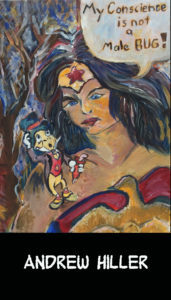 Each of the magnets are a one panel comic strip with a pop culture mash-up. This one featured Wonder Woman and Jiminy Cricket with the Amazonian warrior saying, “My conscience is not a male bug!”
Each of the magnets are a one panel comic strip with a pop culture mash-up. This one featured Wonder Woman and Jiminy Cricket with the Amazonian warrior saying, “My conscience is not a male bug!”
She looked at it, read, smiled and then chuckled, and said–
“That’s really great!”
I smiled warmly. It felt like I was giving something back to someone whose works had given me so much.
January 21, 2019
How a book saved my ass at Mars Con
Last year at Mars Con I sold to a guest a copy of A Climbing Stock, telling him my novel was in the mold of Spaceballs and Princess Bride. He told me those were his two favorite movies and if the book didn’t measure up he’d find me and kick my ass.
I am proud to report that he found me and told me that not only did he love it, but gave it to his mother and then nephew to read. He spent about five minutes going over things he loved.
I think my ass is safe.
Moments like this mean the world to us writers. If there is a work you love share that with your friends and its creators too. Chances are you’ll give that author a cherished gift.
January 16, 2019
Ninth Step Station
One of the benefits of an anthology or collection is that the reader is exposed to different writers and gets the opportunity to discover a new diamond. Ninth Step succeeds in this regard. There were several really compelling episodes and watching how each author took on the cast, setting, and the past details left behind by the previous author. In this, both the authors and editor deserves a lot of credit. The stories flow together really well. The characters maintain the same personality even as new aspects are unfolded.
Set in a near future Tokyo caught between rival world powers, Ninth Step Station tells the story of a partnership between a Japanese inspector and an American peacekeeper. The book progresses like the episodes of a TV series, each story being both standalone and linked to the previous one. Several themes emerge and a few nuggets set up in Episode 1 get their payoff later in the city. Also similar to many TV shows, Ninth Step Station has been written by a team of talented writers.
January 10, 2019
Spinning Silver
Before I get to reviewing Naomi Novik’s Spinning Silver, I thought I’d share an anecdote.
When I was in middle school, our chorus teacher asked me to try out for the state choir. Part of this, I’m sure, was just because my voice had changed early and I could produce a strong baritone/bass which for that age group is always in demand. I auditioned well and they asked me to join, but when I looked at their winter repertoire I hesitated. There were a lot of beautiful songs on that list, but as my eye trailed downwards something felt wrong.
“Sir,” I said, “We’re singing twenty songs?”
The choir leader nodded.
“But fifteen of them are Christmas songs and the other five are secular.”
He blinked at me. I took a deep nervous breath, willing him to understand. It’s a bit hard, after all, for a twelve year old to confront an adult. It’s even harder when that grown up has the power to accept or reject you. I remember waiting for a full musical rest for the light bulb to go off behind his eyes. It didn’t. So, I shuffled backwards a bit and continued.
“I’m Jewish. Couldn’t there be at least one song on the list for me?”” I blurted and then he was the one to look away.
I don’t think he meant any harm. I really don’t. I really think he just picked a selection of beautiful winter music and there are many truly lovely Christmas songs. I know them. I enjoy singing them. It’s fun to see the faces light up in the audience or in the street when they hear a cherished tune.
Upon reading Naomi Novik’s Spinning Silver, I feel included. I feel like I got a song.
Novik has created a Jewish fantasy story: One where the traditions and Jewish people are respected and not painted in stereotypes; one where the protagonist… the hero of the story is Jewish; one where the culture permeates the novel and the hero’s thinking, but best of all the story is not about the Jewish plight, the Jewish tragedy, or Jewish suffering. It’s just a story of people that happens to include a kind Jewish family.
The characters are wonderfully rendered, each distinct, with their own stakes, motivations, and drives. There are three split narratives that weave together beautifully. It preys a bit on the Rapunzel fairy tale, but uses it mainly as a springboard, before becoming a story of winter elves, fire demons, czars, money lenders, marriage, promises, debts, and so much more.
The prose is elegant and written in a way that feels both intimate and familiar, as if this was an old tale that has been passed down many generations. The details are gauzy and sharp in turn. If there’s any downside, it’s that the fairy tale nature can lead to the mind wandering a bit and a little bit of daydreaming while reading.
Still, it’s a really lovely beautiful tale. More importantly, on a shelf full of beautiful stories… I feel I have one that was written for me, but like all the best songs, it’s best when shared and harmonized and given to be song by every kind of voice.
January 9, 2019
The Rose Society
Marie Lu’s Rose Society picks up right where The Young Elites left off. Adelina and her sister are running for their lives and from betrayals in search of allies and a way to sate ambition. The Lead Inquisitor hunts for the Dagger Society and the path of our protagonist continues to whither from hero and anti-hero to outright villain.
This origin story of how an abused girl transforms herself into a super villain is compelling. The action, both emotional and physical, moves at a quick beat as Adelina gathers allies and makes her move across the chessboard of three nations. In her second go around, Lu’s antagonists and subcharacters are given more attention. They become not only worthy foils, but more sympathetic and well rounded.
There are one or two logic holes and a few story gaffes which glare, but this is not only a superhero story, but epic fantasy and it makes sense that the reader must blink their eyes at reality occasionally and quiet that voice that speaks of physics or story consistency. Still, I never felt compelled to stop reading or to roll my eyes. The narrative just flows sweet over the eye.
It is a bit of a cruel book, but not unduly so. Marie Lu in her acknowledgements admits this is her darkest work of fiction. Yet one can’t help sense that there’s a bit of light, a touch of hope that may just win out. Overall, I had enough fun that I will happily continue with this series… if for no other reason than to see if my suspicions prove out.



